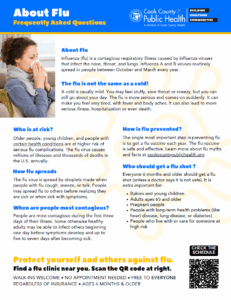Flu
Cook County Department of Public follows the scienced-based vaccination recommendations of the Illinois Department of Public Health for flu, COVID-19, flu and RSV vaccinations. Access more details about our vaccination guidance to prevent respiratory illnesses here .
For other routine, non-seasonal, vaccinations, we follow the recommended vaccination schedule of the American Academy of Pediatrics as well as the CDC adult immunization schedule and the CDC youth immunization schedule from Aug. 7, 2025.
Get free flu and COVID-19 vaccinations at our Saturday vaccination clinics.
About Flu
Flu is a contagious respiratory illness caused by influenza viruses that infect the nose, throat, and sometimes the lungs. It can cause mild to severe illness, and at times can lead to death.
Prevention
- The single most important step in preventing flu is to get a flu vaccine each year.
- Children at least 6 months old, all pregnant people and adults 18 and older should get a flu vaccine, per state of Illinois guidance .
- The flu vaccine is safe and effective.
- Check out these CDC strategies to prevent respiratory illnesses .
Find vaccines
- Free flu and COVID-19 vaccination clinics in suburban Cook County
- Vaccines.gov
- Cook County Health
- Vaccines for Children (VFC) program (free for eligible children). Find out if your child qualifies.
- Health care providers
- Pharmacies (for children 3 years and older)
Updated December 8, 2025, 3:54 PM

